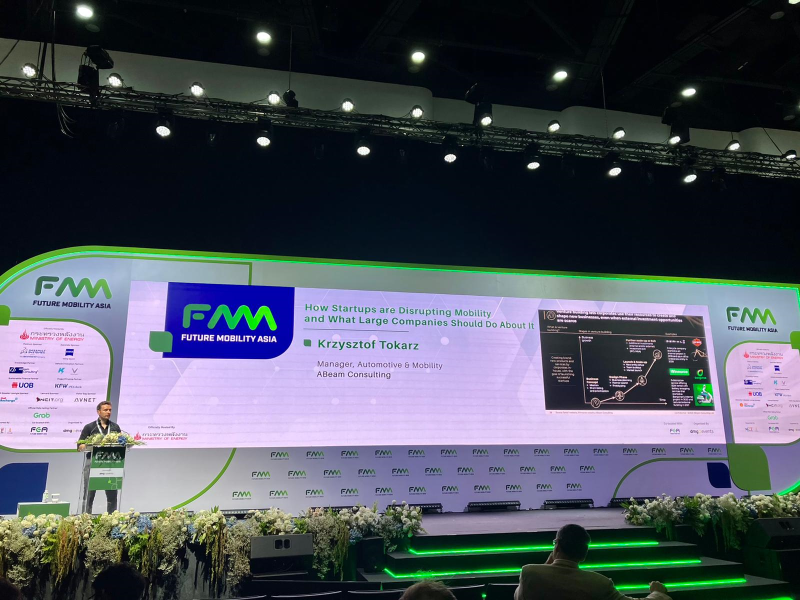ABeam Consulting’s expert gives insights on how large companies in SEA should engage with the mobility startup ecosystem
(Bangkok, Thailand), Over the past decade, the startup mobility ecosystem has experienced significant growth in investment. Southeast Asia has also witnessed this growth, with the mobility startup ecosystem accounting for approximately 20% of total startup investments in the region over the past five years. However, these investments have predominantly concentrated on ride-hailing and used car marketplace players, with limited investments in the areas of electric, connected, and autonomous mobility.
The convergence of rapid technological advancements, environmental imperatives, and a dynamically evolving competitive landscape requires large companies to reevaluate their vision, objectives, and strategy. Krzysztof Tokarz, Manager, Automotive and Mobility, ABeam Consulting (Thailand) Ltd., shared his insights on this matter at the international ministerial mobility forum Future Mobility Asia 2023 (FMA 2023), held in May at the Queen Sirikit Convention Center. ABeam Consulting served as the official knowledge partner, addressing the topic "How Start-Ups are Disrupting the Future of Mobility".

“Large corporations embarking on the path to redefine their vision will likely recognize the need to cultivate partnerships, particularly with startups, to foster the development of novel capabilities, products, and services,” Krzysztof said during the keynote speech on May 19. “We believe that large companies headquartered in Southeast Asia, who wish to play a significant role in the mobility sector, need to actively engage with the mobility startup ecosystem through multiple avenues. This includes partnering with local startups, collaborating with startups from outside Southeast Asia, and even incubating new ventures from the ground up, in order to fully capitalize on the associated benefits”, he added.
Between 2018 and 2022, more than 2 trillion US dollars were invested globally into startups. Asia accounted for 30% of that amount and Southeast Asia accounted for roughly 3.5%. Mobility startups in Southeast Asia received US$15 billion, which represents less than 1% of global investments or about 20% of all investments in Southeast Asia’s startup ecosystem. Notably, the majority of this amount, 86%, was concentrated in two companies: Grab and Gojek.
When examining the top 15 startups in terms of funding received in the last five years, the list is dominated by shared mobility players – ride-hailing players such as Grab but also a couple of car-sharing and micro-mobility players such as Beam and SOCAR Malaysia. However, the largest number of most-funded startups belongs to the used car marketplace space that includes Carro, Carsome, Moladin and myTukar.com. Following the ride-hailing hype, this space has garnered significant attention recently.

In terms of investor breakdown, nearly 80% of investments made in mobility startups in the last five years were made by financial investors, especially venture capital firms as well as some private equity firms. Large companies or, in other words, strategic investors, were involved in a little over 20% of all investments. Most of the strategic investors were companies with their core business outside of the automotive industry, e.g., energy companies or banks. Automotive companies were involved in only 5% of investments.
According to Krzysztof, large companies from Southeast Asia can engage in the mobility startup ecosystem through three key approaches. He stated, “The first approach is to partner with local startups from Southeast Asia. However, this approach may be limited by the number of investment opportunities available in the regional mobility startup ecosystem. Therefore, for most companies, this approach alone may not be sufficient.”
“The second approach is to explore partnerships with startups from outside Southeast Asia. Especially startups from small countries that have well-developed startup ecosystems such as Taiwan or Israel are likely to be interested in developing partnerships with local Southeast Asian companies to help them tap into the nearly 700-million-people market in the region. Finally, large companies should also consider building new ventures from the ground up so that they have an opportunity to get involved in businesses that are the most strategically aligned with the company’s goals.”
Over the past ten years, Krzysztof has supported clients from the automotive, manufacturing and energy sectors. His areas of expertise include strategy, digital transformation and corporate innovation. Recently, Krzysztof has been involved in developing market entry and growth strategies, as well as advising on car retail transformation.
About ABeam Consulting (Thailand) Ltd.
ABeam Consulting (Thailand) Ltd. is a subsidiary of ABeam Consulting Ltd. – headquartered in Tokyo having 6,900 people serve clients throughout Asia, the Americas and Europe providing consulting services in Thailand since 2005, ABeam Consulting (Thailand) has more than 400 professionals serving clients in Thailand with expertise in business and digital transformation services that create the future together with corporations and other organizations. As a creative partner leading the way reliably through change, we contribute to industrial and societal change.
Please contact us at contactthailand@abeam.com or visit https://www.abeam.com/th/en for more details.


